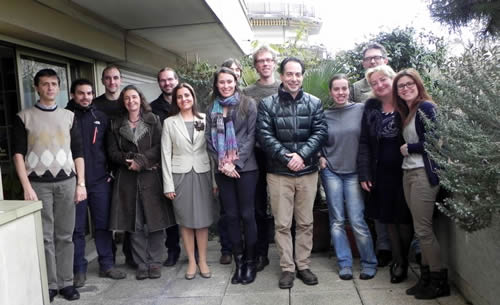
EPPO Training course on the EPPO Prioritization process
for invasive alien plants
Paris, EPPO Headquarters, 2013-03-12/14
EPPO organized a training course on the EPPO prioritization process for invasive alien plants attended by 11 participants from 9 countries. The training course consisted of general presentations spread over the 2 first days on the following topics:
- EPPO activities on Pest Risk Analysis;
- Definitions and concepts related to biological invasions;
- EPPO Standard on the Prioritization process for invasive alien plants;
- Applications of the prioritization process in different countries (in particular in France) including its comparison with other methods;
- Insights on uncertainties when performing prioritization assessments.

Participants - View more pictures ![]()
Participants had the opportunity to test the process for the invasive alien plants Ludwigia grandiflora, Heracleum mantegazzianum and Solanum elaeagnifolium during the course using the CAPRA software which provides a computer version of the prioritization process, and to discuss differences between assessments. Remarks and guidance were provided to each participant on their individual assessments for these species. Participants also assessed individually or in groups three species of concern for their country that they had selected and collected information on prior to the meeting.
Participants had the opportunity to present the outcomes of their assessments to the other participants and to provide recommendations on how to improve the process and its computer version. The participants also shared experience on how to use the Global Biodiversity Information Facility (GBIF) Niche Model. The participants were also presented other EPPO standards and publications relevant to invasive alien plants: the National Regulatory Control Measures, the EPPO Reporting Service, and the EPPO Bulletin.
Presentations
The European and Mediterranean Plant Protection Organization (EPPO) and Pest Risk Analysis
Ms Brunel (EPPO)
Underlying definitions and concepts related to biological invasions
Mr Brundu, University of Sassari (IT)
The EPPO Prioritization Process for Invasive Alien plants
Ms Brunel (EPPO)
Comparison of the EPPO Prioritization process and the ‘Weber & Gut’ Weed Risk Assessment for alien plants in France
Mr Fried, Anses (FR)
Harmonising the invasiveness concept: the EPPO prioritization scheme as a tool to identify the most invasive plant species in Europe
Ms Brunel (EPPO) & Mr Fried, Anses (FR)
Uncertainty & Bayesian networks for the prioritization of invasive alien plants
Mr Brundu, University of Sassari (IT)
How to use GBIF available distribution data on species occurence in the world and the niche model for the EPPO prioritisation process
Mr Brundu, University of Sassari (IT)
Presentations prepared by the trainees during the course
Prioritization process for invasive alien plants, the case of Amaranthus retroflexus for Finland
Mr Tuomola, Finnish Food Safety Authority Evira (FI)
Prioritization process for Ambrosia artemisiifolia for Belgium, the Czech Republic, Finland, Italy, Serbia & Turkey
Mr D’hont, Belgian Biodiversity Platform (BE)
Prioritization process for Asclepias syriaca for Czech Republic
Ms Sojneková, State Phytosanitary Administration (CZ)
Cortaderia selloana, prioritization process assessment for Croatia and Italy
Mr Lazzaro, University of Florence (IT), Mr Novak & Ms Kravarščan, Plant Protection Institute (HR)
Prioritization process assessment for Polygonum perfoliatum for Turkey
Ms Arslan, GAP Agricultural Research Institute (TR)
Lonicera japonica, Slovenian point of view
Mr Jogan, University of Ljubljana, BF (SI)
Prioritization process assessment for Cannabis sativa for Serbia
Ms Marisavljevic, Plant Protection Institute (RS)
Prioritization process assessment for Sicyos angulatus for Italy and Slovenia
Mr Jogan, University of Ljubljana, BF (SL) &Mr Solmi, Plant Protection service (IT)
Prioritization process assessment for Rudbeckia laciniata for France and Belgium
Ms Mandon-Dalger, Fédération des Conservatoires Botaniques (FR) & Mr D’hondt, Belgian Biodiversity Platform (BE)
